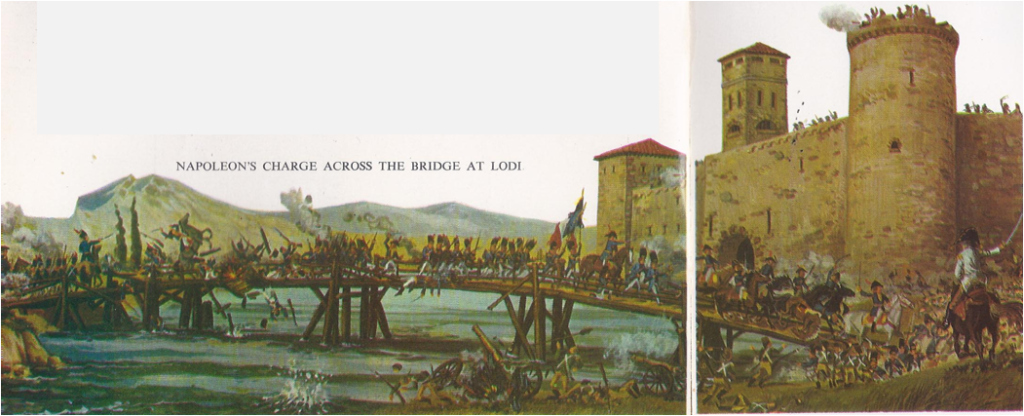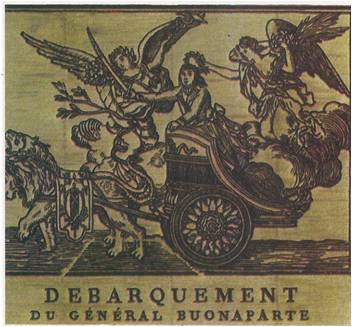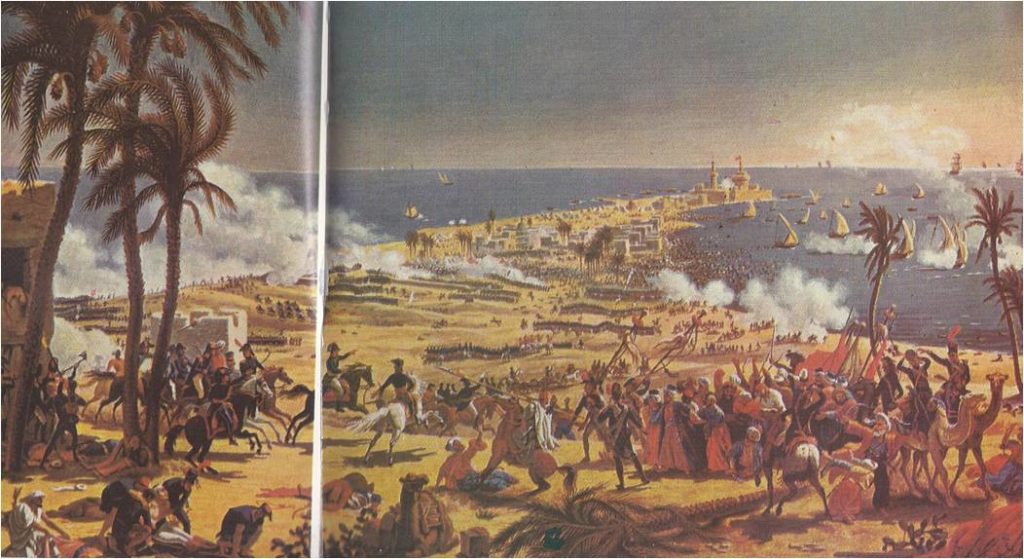In March of 1796, a new commander named Napoleon Bonaparte was placed in charge of the French army on the Italian front. The soldiers and officers were amazed when they first saw him. He was short, thin, pale, only twenty-seven years old and spoke French with an Italian accent.
Napoleon was not an unknown. He had first come to public attention as the young artillery officer who drove the British fleet from the harbour at Toulon. Later, as a brigadier general, he had successfully defended the Convention from an uprising in Paris.
What most people did not know was that he had been a rebel most of his life. He had been born on the island of Corsica, a rebel stronghold, where fighting for independence from French rule was considered the duty of patriots. His father had been a rebel leader and the boy Napoleon had dreamed of the day when he, too, would lead a Corsican rebellion against the French. He had kept that dream alive during his years in French military school and even after he had become an officer in the French army.
During one of his visits to the island, while on leave, he had actually tried to stir up a rebellion in Corsica. The attempt failed and that put an end to his boyhood dream, but he still remained a rebel at heart.
Napoleon’s new army was a small one of only 30,000 troops and most of them were suffering for want of food and clothing. This was the army with which he was expected to fight the Austrian troops in Northern Italy. According to French war plans against Austria, the Italian campaign was supposed to keep enemy troops busy on the southern front while the main attacks were launched by two large French armies along the Rhine River in the north. These armies were to close in on Vienna, the capital of Austria, from different directions. Napoleon knew these plans very well, but he also had some plans of his own.
“Soldiers, you are half starved and half naked,” he told his men. “The Government owes you much, but can do nothing for you. . . . I will lead you into the most fertile plains of the world. There you will find flourishing cities, teeming provinces. There you will reap honour, glory and wealth. Soldiers of the Army of Italy, will you be wanting in courage and firmness?”
Never had the soldiers heard such talk from a general and they were encouraged, yet they could not help wondering, for what Napoleon promised was almost a miracle.
Napoleon had something of a miracle in mind. The enemy forces, snug in their winter quarters on the other side of the Alps, would hardly be expecting the French to strike before late spring, after the snow had melted from the high mountain passes. To take the enemy completely by surprise, Napoleon decided to begin his invasion as soon as possible.
THE LITTLE CORPORAL
After a whirlwind of preparations, he led his troops around the southern end of the Alps and northward over the hard winter snow in the passes of the Apennine Mountains. The French cut between outposts of Sardinian troops on their left and outposts of Austrian troops on their right, defeating each in turn. Napoleon fooled the Sardinians into thinking that his army was much larger than it really was and so forced their king to sign a truce. In less than three weeks he had crossed the mountains and won a kingdom. His soldiers were amazed and filled with admiration.

Driving the Austrians across the plains of Lombardy, Napoleon won victory after victory. One of his most dating movements was a charge across a narrow bridge at Lodi. His soldiers reported, “It was a strange sight to see Bonaparte that day, on the foot of the bridge, under an infernal fire and mixed up with tall grenadiers. He looked like a mere boy.” His soldiers cheered him after the victory and to show their affection, nicknamed him the “Little Corporal.” He entered Milan, the Lombardy capital, in the middle of May. The Austrians withdrew and locked themselves up in the great fortress of Mantua, blocking his way to the east and the north.
By this time Napoleon had become the hero of France. While the French armies in Germany were meeting with failure, Napoleon’s series of brilliant victories in the south astonished and thrilled the nation. High government officials found that his victories in Italy were making him difficult to deal with. They felt it was not good that so much military glory should be reaped by one man, particularly a young man who was leading his first command. They decided to send General Kellermann to Italy to share Napoleon’s command as well as his glory.
Napoleon protested in a letter: “Everyone has his own way of conducting a battle. General Kellermann is more experienced than I and would do it better: but the two of us together would do it extremely badly. I can serve the country efficiently only if you give me your full confidence.”
The officials changed their minds about sending Kellermann, for Napoleon did have their full confidence in military matters. What they feared was that he might become so popular that they could no longer control him.
Napoleon conducted a brilliant campaign in Italy, but he enjoyed advantages which made him look better than he was. The generals he faced in battle were old men. One was seventy-two, another in his middle sixties. Still another suffered from gout and had to be carried from place to place. These generals believed in the old-fashioned rules of war. They advanced toward the enemy with their troops marching side by side in long lines. Napoleon struck at these lines with flying columns. Like an angry bee he charged at them from one direction and then another, breaking up their beautiful formations and causing a great deal of confusion. They never knew what to expect from him next.
VICTORY IN ITALY
The enemy generals complained bitterly. One of them wrote: “This beardless youth ought to have been beaten over and over again, for whoever saw such tactics. The blockhead knows nothing of the rules of war. Today he is in our rear, tomorrow on our flanks and the next day again in our front. Such gross violations of the established principles of war are insufferable.”
Napoleon also had the advantage of a young army and young officers. He could move quickly and keep the enemy off balance with surprise attacks. For his officers he chose men of great daring. The timid and the slow were weeded out. Those who were fearless in battle were quickly rewarded with promotions. Furthermore, his troops were fighting for a cause. They were fighting not only to defend liberty at home, but also for world revolution.
Napoleon could deliver the message of liberty to the Italians in their own tongue, for that was the language of his childhood home in Corsica. “People of Italy, the army of France comes to break your chains. It is a friend to all the peoples. Have confidence. Your Property, your customs, your religion, shall be respected.”
With threats and appeals Napoleon soon forced most of the ruling princes and kings of Italy, as well as the Pope, to make peace with him on his terms. From them he demanded large sums of money, libraries, museums and priceless art treasures, all of which he sent on to Paris as the booty of war.

The fortress of Mantua in Northern Italy held out against the French for more than seven months. Austria made several attempts to rescue the fort, but Napoleon could not be driven off. One of his greatest victories came when he defeated an Austrian army of 50,000 troops at Rivoli on January 14, 1797. The fort of Mantua soon surrendered, making it possible for Napoleon to march on toward Vienna. Unable to stop his advance, the Austrians signed a truce in April, which was followed by a peace treaty a few months later. In this way Napoleon brought his victorious Italian campaign to a close and his fame had spread to all the countries of Europe.
After a hero’s welcome in Paris, he became restless. He could not afford to remain in Paris long, doing nothing, he told his secretary. “My glory is already threadbare. . . . I must go to the East. It is there that great glory can be won.” He had a wild dream of becoming another Alexander the Great by carving out a large empire for France in the East.
France was still at war with England and Napoleon was asked to lead an invasion of the British Isles, but he did not want to give up his dream of conquest in the East. He managed to convince the government that the best way to strike at England would be to send an army to Egypt, cutting off the British trade route to India. Egypt could also serve as a stepping-stone to India, where France and England were fighting for colonial power.
THE FIRST CONSUL
Sailing from Toulon in May of 1798, Napoleon’s army took Malta early in June, then continued on to Egypt. The city of Alexandria fell on June 30. Three weeks later, at the foot of the pyramids, the French won a remarkable victory against the Mamelukes and became the masters of Egypt. A few days later, a large British fleet under the command of Lord Nelson surprised the French fleet lying at anchor in Aboukir Bay and destroyed it. This naval victory gave England control of the Mediterranean and bottled up the French forces in Egypt. Napoleon was left helpless.

While he and his men were suffering hardships from heat and plague in Egypt, the British landed an army of invasion in Holland. Austria, Turkey, Russia and Naples also declared war on the French and defeated them on several fronts. The French were soon forced out of all Italy except Genoa.
When Napoleon heard the news, he turned over his army to his second in command and left it in Egypt. He secretly set sail for home on a small frigate, somehow managing to reach France in spite of the British patrols in the Mediterranean. The French people were happy to have him back in the country, for they felt he brought them good luck. They had lost confidence in the republic under the Constitution of 1795. The leadership of that government was in the hands of five directors, who spent much time arguing among themselves. The result was a weak government. Conditions in France were very bad. Taxes went uncollected, French money lost its value and unemployment was rising. There was confusion everywhere, and civil war raged in some of the provinces.
Most Frenchmen were neither surprised nor alarmed when Napoleon and several other men overthrew the government. There was no violence. People felt that the old government could not have lasted much longer in any event. It had failed at its job of ruling the country.
Napoleon and his partners presented France with a new constitution on December 15, 1799. It provided for three Consuls to lead the government for a term of ten years. Napoleon was named First Consul, with special powers and thus became the most powerful man in the country. The new government also had two legislative assemblies, but these could not make law. They could only accept or reject proposed laws sent to them by the Consuls.
To rebuild the nation Napoleon needed a period of peace. He crushed the civil war in France, and made offers of peace to England and Austria. Both countries found his terms unreasonable and turned him down, so again he led an army against the Austrians in Northern Italy. This time he went by way of the high Saint Bernard Pass of the Alps, where Hannibal and his army had crossed 2,000 years earlier. Gun carriages had to be taken apart and carried over in pieces. The guns themselves were lashed to log sleds, each dragged through the snow by a hundred men.
Again Napoleon took the enemy by surprise. He was in the Po Valley before the Austrians even knew he was in Italy. After a few minor victories, he entered Milan on June 2, 1800. Less than two weeks later came the great battle at Marengo. The Austrian army, with more troops and more cannon than Napoleon had, forced the French back and their defeat seemed certain, but reinforcements arrived in time and the French won another remarkable victory.
The truce was signed the following day. After still another French victory at Holenlinden a few months later, the Austrians signed a peace treaty in February of 1801. By that treaty the French gained control of most of Italy and Russia later accepted the peace terms. England defeated the French army Napoleon had left in Egypt and signed the Peace of Amiens on March 27, 1802.
DICTATOR OF FRANCE
At last France was at peace with all of her neighbours. More popular than ever, Napoleon was hailed as the “genius of war,” and the “angel of peace.” He won praise even in England, where shops in London sold pictures of him which were labeled “The Saviour of the World.” Later that same year the French proclaimed Napoleon Consul for Life. They had many good reasons for their great faith in him. Since coming to power he had built a strong and efficient national government, which collected taxes regularly and gave the people a sound money. He had encouraged industry, reduced unemployment and established public schools. In addition, he had worked out a whole new system of laws‚ known as the Code Napoleon, which included many gains of the revolution. It recognized, for example, that all citizens were equal before the law and that each person had the right to choose his own profession and his own religion.

Napoleon was not a religious man himself, but he won the loyalty of many French Catholics by signing an agreement with the pope. He granted the Church more freedom in France and in exchange, the pope gave up all claim to lands taken from the Church during the revolution. Army officers, gathering in Paris after the peace, complained about the religious agreement with Rome and became critical of Napoleon. To win their loyalty, he created a new order called the Legion of Honour, to which he appointed the leading heroes of France. Soldiers honoured in this way also received a liberal income from the government and Napoleon’s critics soon became his loyal supporters.
Always driven by his hunger for power, Napoleon had a new constitution written shortly after he became Consul for Life. It gave him the power to make treaties, to dismiss the legislative bodies and to change court decisions which did not please him. He could even make changes in the constitution, with the approval of the senate and that body was not likely to resist his will, since he alone had the right to choose the candidates to it.
Napoleon had made himself the dictator of France.





